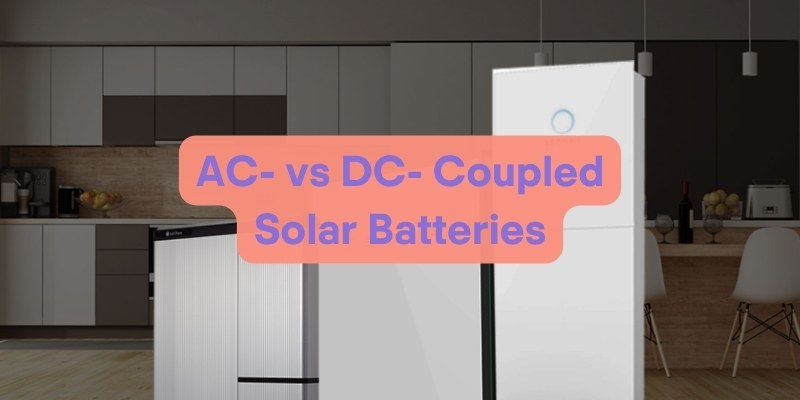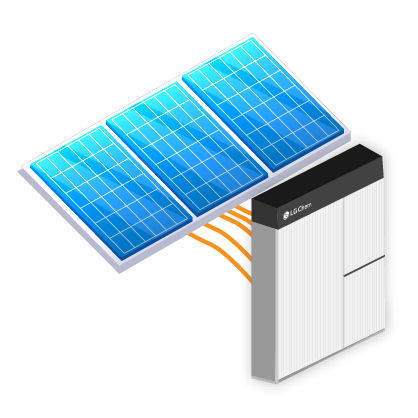Should I Get an AC- or DC-Coupled Solar Battery?
With utility rates soaring and net metering policies eroding, home battery storage systems have become essential for homeowners to control their essential electricity costs. But picking a solar battery isn’t as easy as picking a AAA to power your TV remote.
One of the key decisions homeowners confront is whether to invest in AC- or DC-coupled solar batteries — which can impact the cost, efficiency, and overall complexity of their system.
In this article, we’ll explore the key differences between AC- and DC-coupled batteries and how to choose a battery type that best serves your energy goals.
What’s The Difference Between AC-Coupled vs. DC-Coupled Solar Batteries?
The main difference between AC- and DC-coupled batteries is the type of electrical current that flows into the battery. All solar batteries store DC electricity, but AC-coupled batteries are designed to receive alternating current (AC) while DC-coupled batteries are designed to receive direct current (DC).
On a practical level, DC-coupled batteries are more efficient because they can receive the DC electricity produced by solar panels. On the flip side, AC-coupled battery systems are less efficient because the direct current from the solar panels must be inverted twice — from DC to AC, then back to DC — before actually going into the battery for storage, and a little bit of energy is lost each time the current is inverted.
In both instances, the stored DC electricity must be inverted to AC as it exits the battery so it can be distributed throughout the home or local power grid.

So why even have AC-coupled battery systems if they are more complicated and less efficient? To better understand that, we need to take a look at your home energy ecosystem.
AC vs DC electricity in your home
As mentioned above, there are two types of electrical currents — AC and DC — that are used in different ways. AC is better suited for transporting electricity over distances and is therefore used by the electrical grid, the wiring inside your home, and certain household appliances like toasters, garage door motors, and washing machines. DC is better suited for energy storage and powering certain household devices like laptops, TVs, and microwaves.
| Alternating Current (AC) is… | Direct Current (DC) is… |
| Distributed throughout home | Produced by PV solar panels |
| Distributed on the utility power grid | Stored by battery storage |
| Used to power toasters, garage door motors, and washing machines | Used to power TVs, microwaves, and device charging |
So, in a typical solar system without battery storage:
- The solar panels produce a direct current
- A solar inverter changes it to an alternating current to distribute throughout the home or export onto the grid
- Certain appliances use AC current while others have dedicated inverters (like the black box on your laptop chord) to invert the current once again to DC
Many modern solar-only systems have microinverters attached to each solar panel, so the first inversion takes place before the electricity ever leaves the solar panel. In order to add batteries to these systems, the battery needs to be able to receive AC electricity and invert it back into storable DC electricity — hence AC-coupled batteries.
As you might have guessed, there are unique advantages and disadvantages to AC- and DC-coupled batteries.
Advantages and Disadvantages of AC-Coupled Solar Batteries
AC-coupled solar batteries seamlessly integrate with existing solar inverters, making them a popular choice for retrofitting solar systems. This compatibility with the grid and solar inverters simplifies installation and reduces initial costs.
On the flip side, these systems suffer from double conversion losses — once when DC from solar panels is converted to AC for home use, and again when storing excess AC as DC in the batteries. Due to energy losses during these inversions, the maximum round-trip efficiency for today’s AC-coupled batteries is 90%. So, if your solar system sends 10 kWh of electricity to your battery during the day, you’ll only draw 9 kWh from your battery at night.
So, while upfront costs are lower, the long-term value may be impacted by these efficiency losses and potentially higher maintenance costs.
Advantages and Disadvantages of DC-Coupled Solar Batteries
DC-coupled solar batteries shine in efficiency, with only a single inversion as the current exits the battery, boasting round-trip efficiency of up to 97.5%.
With fewer components, DC-coupled batteries can be easier and less expensive to configure into new solar systems. However, their integration can be complex in existing solar setups, potentially limiting their appeal to new installations or homeowners willing to overhaul their current system.
Examples of AC and DC Solar Batteries
Of our top 8 best solar batteries of 2023, five are AC-coupled and three are DC-coupled (including the Panasonic Evervolt which can be configured either way).
Our top AC-coupled batteries include:
| Battery | Round-trip efficiency |
| FranklinWH aPower | 89% |
| LG ESS Home 8 | 90% |
| sonnen Core+ | 86% |
| Enphase IQ 3T/10T/5P | 89% |
| Tesla Powerwall | 90% |
| Sunpower SunVault | 86% |
| Panasonic Evervolt (AC configuration) | 89% |
Our top DC-coupled batteries include:
| Battery | Round-trip efficiency |
| LG RESU 10H/16H Prime | 97.5% |
| Generac PWRcell DCB | 96.5% |
| Panasonic Evervolt (DC configuration) | 94% |
Based on round-trip efficiency alone, DC-coupled batteries are the easy choice. However, there are more factors to consider when deciding which type of battery is best for your solar system.
Factors to Consider When Choosing Between AC and DC Solar Batteries
Selecting the appropriate solar battery coupling hinges on multiple factors, including the current solar setup, efficiency concerns, installation specifics, and compliance with legal standards.
Let’s start with the most obvious factor: Whether the battery is being configured into a new or existing solar system.
Existing Solar Infrastructure
As a rule of thumb, AC-coupled batteries are better suited for adding into existing solar systems while DC-coupled are better suited for installing at the same time as the solar panels. However, with enough time, money, and installation expertise, it is possible to configure a DC-coupled battery into an existing solar system.
As we covered above, many modern solar systems have microinverters attached to each panel that flip the current from DC to AC before it even leaves the panel. In order to configure a DC-coupled battery into such a system, you’d need to remove the microinverters from each panel — which requires additional labor and essentially wastes the microinverters.
The process can be a bit simpler in systems with a single “string inverter” that inverts electricity for all the panels. However, there is still a significant amount of labor and waste in such a re-configuration.
Efficiency and Battery Usage
Another key factor to consider when deciding between AC- and DC-coupled batteries is the system’s round-trip efficiency and how you are going to use your battery storage.
Let’s say you are deciding between an AC-coupled battery with 90% round-trip efficiency and a DC-coupled battery with 97.5% round-trip efficiency. If you only plan on using your battery for essential backup power when the grid goes down, that extra 7.5% efficiency may not be worth paying for — especially if you need to configure the DC-coupled battery into an existing solar system. However, if you plan on charging and discharging the battery every day in self-consumption mode to reduce your electricity bills, then that 7.5% difference in efficiency will certainly add up over time.
Efficiency becomes an even greater factor if you plan on powering large loads like air conditioning and home EV charging. If you have a three-battery system with 40 kWh of usable capacity, then a 90% efficient system would allow you to access 36 kWh while a 97.5% efficient system would give you access to 39 kWh.
Over time, 3 kWh per cycle adds up to significant energy and cost savings.
Installation Complexity and Costs
One of the most influential factors in large purchases like a home battery is the upfront cost. Battery prices vary based on a number of factors, but perhaps the most influential is the scope of work.
In general, it’s more cost-effective to install batteries at the same time as solar panels, because many of the soft costs (labor, permitting, inspection, etc) overlap. In that case, it’s also more cost-effective to buy a DC-coupled battery because it requires fewer inverters and simplifies the system configuration.
On the other hand, if you are adding a battery to an existing solar system, installing an AC-battery is typically more cost-effective because you are avoiding the addition labor of removing the solar inverters and re-configuring the system.
Regulatory Restrictions and Grid Connection
Navigating the complex landscape of energy regulation is crucial when selecting a solar battery system. Local and national electrical codes often dictate whether an AC- or DC-coupled system is permissible, with some jurisdictions having specific requirements for grid-connected solar installations. These regulations can influence the type of inverter you can use, the manner in which your solar battery integrates with the grid, and even the overall efficiency and cost-effectiveness of your setup.
For instance, certain areas may mandate anti-islanding protection, which is more straightforward to implement with AC-coupled systems. Conversely, regions with policies that favor self-consumption might align better with the efficiency of DC-coupled systems during daylight hours. It’s essential to consult with a knowledgeable local solar installer who is well-versed in the latest regulations to ensure compliance and optimize your system’s performance.
Is AC- or DC-Coupled Battery Better?
The best battery is that one that empowers you to achieve your energy goals. While DC-coupled batteries offer greater efficiency, AC-coupled batteries are easier to configure into existing solar systems. The best type of battery for your system also depends on how you plan on using your battery.








